
views
- A love-hate relationship is when someone has alternating emotions of intense love and hatred towards someone or something. Oftentimes, it describes romantic relationships.
- You may be in a love-hate relationship if you and your partner fight often and hold onto a lot of resentment but struggle to work through problems as a couple.
- Strengthen love-hate relationships by communicating honestly with your partner and setting boundaries together to resolve the issues between you.
What is a love-hate relationship?
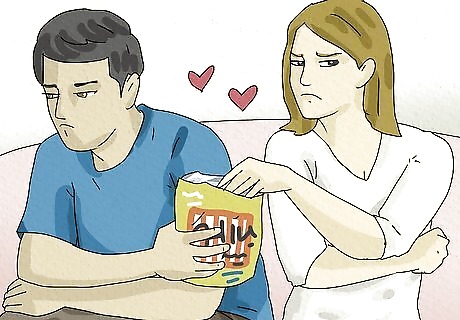
Love-hate relationships result in alternating feelings of love and hatred. In short, this is when your feeling towards something aren't consistently positive or negative; instead, they alternate between the two feelings, love and hate. This can apply to anything, like a job or a your hometown, but most often, they describe relationships. Specifically, they tend to describe romantic relationships that feel like rollercoaster rides, characterized by intense emotions that change often. People in love-hate relationships usually have strong feelings but express them inconsistently and cycle between showing love sometimes and being hostile other times. These relationships often feel exciting and passionate, but because there’s so much conflict, it may be difficult for couples to build a solid future together.
Signs of a Love-Hate Relationship

You keep fighting, breaking up, and getting back together. It may feel like you’re on an endless loop. Fights get intense, with shouting, name-calling, and threats of breaking up. Sometimes, you may actually break up only to get back together a few days later. Everything goes back to normal for a while, and the two of you are super affectionate and loving—until the next fight rips you apart again. Remember, every couple argues sometimes; it’s a natural and healthy part of every relationship. In a love-hate relationship, however, fights tend to be particularly intense and destructive, feeding into the constant on-again-off-again cycle common in love-hate relationships.
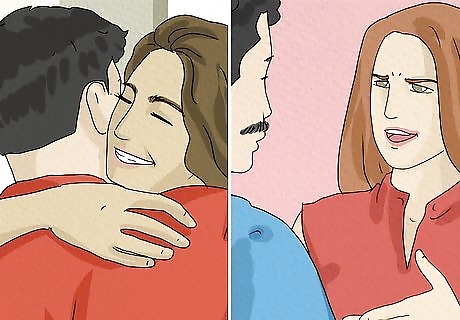
At times, being together feels great, and at times you can’t stand them. Do you experience extreme emotions around your partner? When things are good between you, it may feel like you have the absolute best partner in the world—but when there’s tension, you may find that even the smallest issues make you resent your partner and wonder whether you made a mistake by committing to them. For example, you may feel great with your partner one moment, then feel infuriated by their messiness around the house or big ego the next. Once again, all couples have ups and downs; it’s a part of life. However, a small problem here and there usually isn’t enough to make someone consider breaking off the entire relationship.
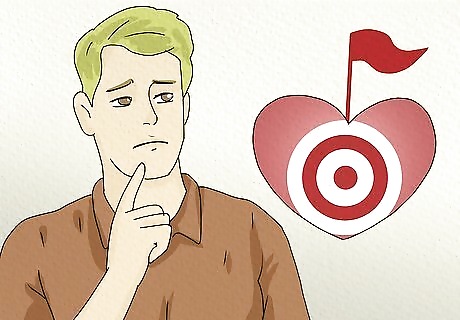
You don’t see a future or discuss long-term goals with them. Consider the future with your partner. Can you picture growing old together or building a life with them? In love-hate relationships, even though the emotions between you are intense, it’s often difficult to see a future together because the relationship feels so volatile. For example, you might reflect on the relationship and realize you have no idea whether your partner is interested in starting a family or where they want to live in the future. Even if you haven’t discussed the future yet, remember: that doesn’t mean it’s too late to start!
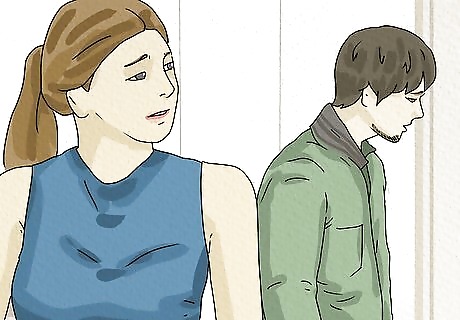
Neither of you addresses issues in a healthy way. As much as you adore your partner at times, if you’re in a love-hate relationship, you may find yourself bottling up everything you don’t like about them—and letting it explode out when the anger builds up. In short, you both air out your grievances but may not find a way to resolve them. Thus, the same problems likely persist no matter how much you argue. For example, say you’re annoyed that your partner is constantly late. In a love-hate relationship, you might let the anger build and argue about it whenever you feel annoyed, but never look for a solution together. It may feel like you have a whole list of baggage and unresolved issues, but if neither of you really does anything to fix those issues, the resentment may build over time.
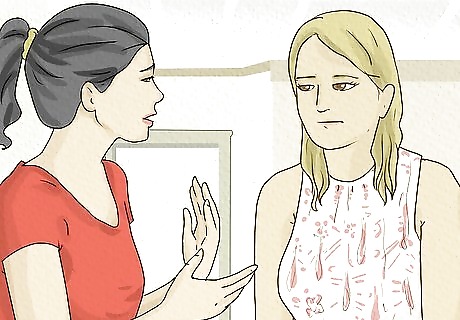
You vent about your partner behind their back. If you often feel frustrated or angry at your partner, it may be tempting to express those feelings to someone who will be sympathetic. That’s why a common sign of love-hate relationships is talking behind your partner’s back; some couples do this to avoid taking out all their resentment on one another—even though those issues need to be addressed. It’s important to keep positivity alive in any relationship, and a key part of that is speaking well of one another, even when you’re apart. That doesn’t mean you can’t have complaints and gripes with each other sometimes—but when you do, it’s best to discuss it together rather than criticizing them to someone else.

You feel anger and resentment toward your partner. Is it sometimes hard to be around your partner without feeling frustration or anger? Does it feel like there’s always a little bit of resentment toward them in the back of your mind? Because issues often go unresolved, love-hate relationships tend to lead to a lot of resentment, no matter how loving and passionate they can be. Reflect on how you feel around your partner most of the time. Does it feel like there’s more resentment than affection in your mind? That’s a sign you may be dealing with a love-hate relationship.

You don’t trust your partner and feel jealous easily. Jealousy may be a common trigger for fights in a love-hate relationship; when one or both partners doesn't like the other talking or interacting with others, they may argue about it often. This jealousy and lack of trust lead to fighting and breaking up on a regular basis—although, of course, those fallouts are rarely permanent. Do you feel afraid to connect emotionally with your partner? Do you worry they might betray you somehow if you did? Those fears may be stopping you from forming a strong bond and ultimately developing trust together.
What causes love-hate relationships?
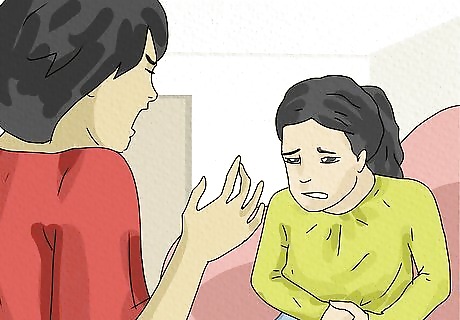
Volatile relationships early in life People who had to deal with chaotic and unstable relationships when they were young may end up feeling comfortable in love-hate relationships later on because they feel familiar. For example, someone who had a volatile relationship with their parents as a child might gravitate to love-hate relationships because, in their mind, intense ups and downs signify that they care for one another. They may even feel like stable relationships are too boring—or they might eventually second-guess how much a stable partner really cares for them. While it’s true that lots of healthy relationships have passion and intensity, constant conflict isn't so healthy for couples. In actuality, a steady relationship can also be super loving—and it’s more likely to stand the test of time.

Feeling unworthy of love When people feel like they’re unlovable or unworthy of love, volatile relationships tend to reinforce those beliefs. They may feel like they don’t deserve anything more, and their chaotic relationship validates those negative thoughts. In short, their vulnerabilities make them think that a love-hate relationship is the only option for them because stable and long-lasting love isn’t attainable. Love-hate relationships may also give them a false sense of being loved. They may feel like the relationship is more meaningful because they endure so much to maintain it—when, in reality, they shouldn’t have to struggle like that. Relationships don’t have to come with constant struggle and sacrifice to be meaningful. What makes relationships special is a couple’s commitment to one another and faith that their love can endure.

Unresolved conflicts between both partners Sometimes, love-hate relationships develop as a result of specific circumstances rather than a pre-existing cause. It may not begin as a rollercoaster of love and hate, but if issues are left to fester and cause resentment, the relationship may grow more volatile over time. A love-hate relationship may develop if: Your partner doesn’t respect your needs Your partner holds you back rather than supporting you Your partner is emotionally unavailable You’re afraid of being alone, even though the relationship isn’t right for you You and your partner are in different places and struggle to connect
How to Deal With a Love-Hate Relationship
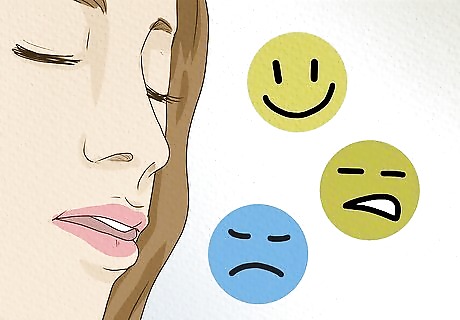
Be more mindful of your emotions. Rather than accepting how things are in your relationship, actively reflect on the situation. Figure out what you feel toward your partner and what about their behavior makes you react with anger and resentment. Grab a journal or piece of paper and write about your emotions as you parse them out; it may help you process your emotions more easily. Practicing mindfulness and analyzing your emotions may help you get some perspective on the situation—and potentially think of solutions to your problems that you couldn’t see before. Reflecting on the relationship may also help you decide whether to walk away or stay with your partner and work on the relationship. Not all love-hate relationships need to end in a dramatic breakup, and working through your emotions is the first step to steering the relationship in a healthy direction!
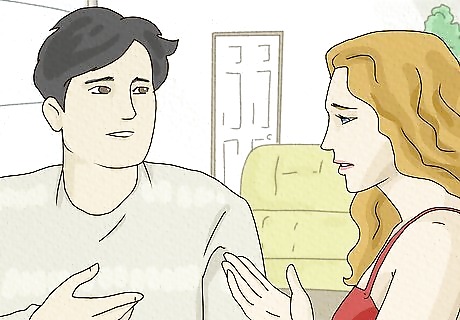
Talk to your partner honestly about things that bother you. Once you have a better understanding of your own feelings, open up the lines of communication between you and your partner. In order to build a more stable, lasting relationship with them, it's important to be able to have honest conversations about the things that bother you. If you can be open and honest with one another, it’s easier to solve problems as a team. For example, if you have a problem with your partner’s tendency to work late and skip out on meals together, bring it up to them respectfully. Focus on how you feel rather than accusing them of anything. Say something like, “I know your work is important to you, but when you work so late that you miss our date night, it makes me feel neglected. Could we figure out how to make date nights a bigger priority from now on?”

Set boundaries in your relationship. Consider what works in your relationship and what needs to change. Once you know what kind of behavior you won’t tolerate anymore, set firm boundaries with your partner so they know what you need from them going forward. By setting boundaries, you’re also taking back your power and creating healthier standards for yourself to live by. For example, say your partner insists on doing everything together, and you want more time for solo hobbies. Explain to them why you need alone time—and that you have the right to ask for it. You might say something like, “I appreciate that you want to spend so much time with me, but I also need some time to relax by myself. Going forward, I’d like to make Wednesday nights my designated alone time.”
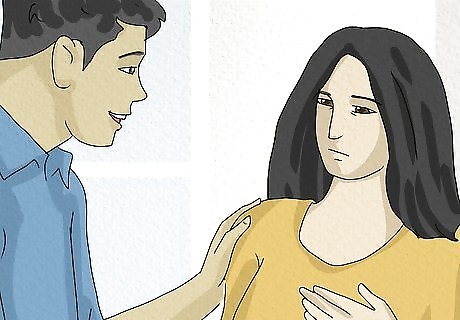
Support your partner and accept your differences. Rather than dwelling on all the things you don’t like about them, focus on supporting your partner and appreciating them for exactly who they are. You may not have all the same values and interests, but supporting one another and compromising when you disagree makes it that much easier to get the relationship on an even keel and prevent conflicts. Try making a list of your partner’s best qualities to remind yourself of all the things you really love about them. Be sure to remind your partner of what you love about them too! Cheer them on when they need a little extra support, and express gratitude to show you care. For example, maybe your partner isn’t the most expressive person but does a lot of small things to express their affection. Say something like, “I want you to know that I see and appreciate how considerate you are. When you make me breakfast on busy mornings or tackle a chore for me, it really makes me feel loved.”

Spend quality time together. Quality time can help you reconnect as a couple and refocus on strengthening your relationship. Come up with a concrete plan to spend quality time together—like a weekly date night, for example, or a night together during the week and a day of quality time on weekends. Use that time to learn more about one another’s interests—and, more than anything, have fun together. Make an effort to reconnect in the bedroom as well. In love-hate relationships, intimacy can be absolutely explosive at times—only to become nonexistent when negative emotions get in the way. As you get the relationship on more stable ground, keep the spark alive by making time for physical intimacy and finding new ways to enjoy your time together in the bedroom.

Get support from a trusted confidante. It can be difficult to turn a love-hate relationship around, and you may need the support of a friend or close family member along the way. A confidante can give you an outsider’s perspective on your relationship, help you analyze the problems you’re having, and give you advice on how to fix them going forward. If you’re in a love-hate relationship and need more than a friend’s support, consider talking to a therapist who specializes in navigating difficult relationships as well. Remember, having negative feelings for your partner doesn’t automatically spell the end of your relationship. It’s bound to happen sometimes—the important thing is working through those feelings in a healthy way.














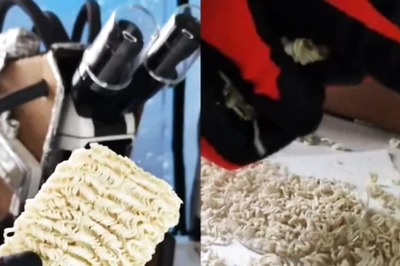



Comments
0 comment